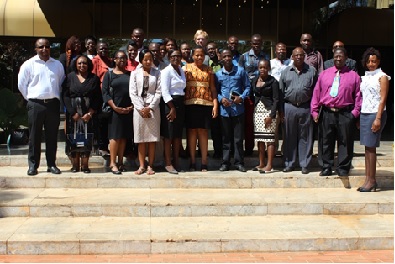The media training brought together 16 journalists, thus giving them an opportunity to better communicate to the general public on water security issues in improving climate resilience, raising awareness on the importance of covering climate change issues and making them newsworthy and also creating a database of media practitioners that report on climate change.
The media training forms part of efforts to communicate the SADC Regional Strategic Action Plan (RSAP) for Integrated Water Resources Management (IWRM) and the presentation given by Dr Kenneth Msibi on the role of the SADC water sector helped to shed more light on that aspect. Presenting on the critical local issues in water governance, Eng Wesley Muchineri, Upper Manyame Sub Catchment Council (UMSCC) noted that the Zimbabwean priorities in water development include catchment management and protection, operationalising IWRM principles, provision of portable water of acceptable quality and quantity within a reasonable distance and provision of productivity water to all sectors of the economy including agriculture.
In an overview of water resources in Zimbabwe by looking at opportunities, challenges and successes Mr Manyangadze, Ministry of Environment, Water and Climate (MEWC) noted that, “water is an economic and social good”. He further added that, “water is a core development issue in Zimbabwe, it is central to agriculture, rural, urban and industrial development”.
The existence of well-defined water resources management institutions Catchment Councils and Sub Catchment Councils, decision making at the lowest possible level and the existence of well-developed water storage infrastructure were identified as some of the opportunities that exist within the Zimbabwean context. However, there have been challenges of pollution, siltation, lack of enforcement of existing laws, harmonization of existing laws, aging infrastructure, sustainability of existing institutions and budgetary constraints that have been encountered.
In her elaboration on water governance as a tool to ensure that water is managed well to guarantee the survival of the growing populations, Norah Spie, a Media Trainer noted that the World Economic Forum (WEF) Global Risk Perception Survey 2015 rated “water crises” as the number one risk facing the world in terms of its potential impact. Therefore, the National Water Weeks are a great platform to find ways of improving water resources management and development and the need for harmonisation of national and local strategies for better water resources management and development.
Additionally, the journalists were refreshed on using Twitter as a platform for actively engaging with the global community about what was happening around them. Spie encouraged journalists to actively participate on Twitter during the National Water Week to raise awareness of the SADC Regional Water Programme.
The media training empowered journalists who attended with additional skills in reporting water issues at local level and raising awareness and understanding of IWRM.
